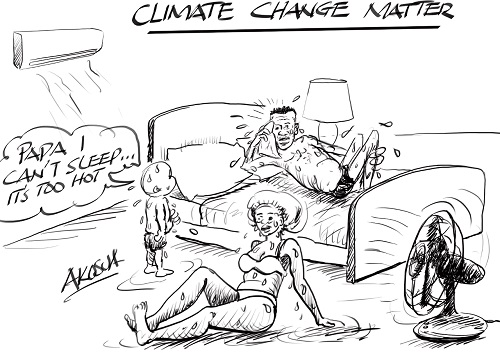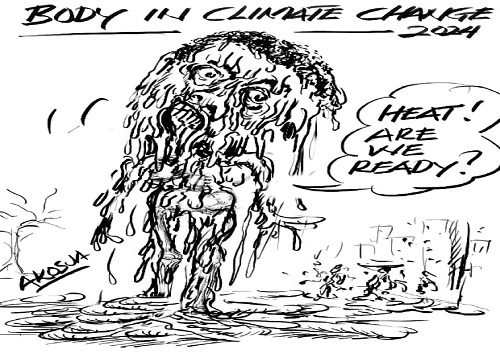
By Peter Justice GARIBA
Ghana is on the frontline of the global climate crisis—not as a major polluter, but as a vulnerable nation bearing the brunt of rising temperatures, erratic rainfall, deforestation, and environmental degradation.
The economic cost of climate change is becoming painfully evident in every sector: agriculture, water, health, and energy. But while global warming is a global problem, our local actions—or inactions—are making it worse.
If we fail to act, Ghana risks not just an environmental collapse, but an economic catastrophe.
The economic cost of climate change in Ghana
The World Bank estimates that climate change could push over one million Ghanaians into poverty by 2050. Agriculture, which employs over 44% of our labor force, is already under threat.
Irregular rainfall patterns are destroying crops, reducing yields, and deepening food insecurity. Coastal erosion is swallowing homes and farmland in places like Keta. The burden on public health and water supply is mounting. Energy production from hydropower is becoming unreliable due to falling water levels in dams.
Every cedi lost to climate impacts is a cedi lost from our national development goals. But what makes this even more painful is that many of the wounds we are suffering are self-inflicted.
We are polluting ourselves into poverty
- Plastic waste and open burning
Our streets, gutters, and waterways are choked with plastic waste. The culture of indiscriminate dumping, coupled with poor waste management infrastructure, is turning our cities into ticking health bombs. Even worse, the burning of plastics—often done in open spaces and near homes—releases toxic chemicals, contributing not only to air pollution but also to respiratory illnesses and cancer.
This pollution damages the environment, burdens our healthcare system, and tarnishes Ghana’s image as a tourism destination. It also threatens fishing livelihoods when plastics end up in our oceans.
- Vehicle emissions and outdated technologies
Our cities are suffocating from vehicle emissions. With weak vehicle emission regulations and a rising importation of second-hand cars, the level of air pollution in Accra and other urban centers has reached alarming levels. Add to this the continued importation of outdated refrigerators and air conditioners that use banned chlorofluorocarbons (CFCs)—potent greenhouse gases—and we are actively contributing to the very climate change we claim to be fighting.
- Galamsey and toxic chemical use
Illegal mining, or galamsey, continues to devastate our rivers, forests, and rural communities. The use of mercury and other dangerous chemicals has poisoned water bodies that millions depend on. Entire ecosystems are being destroyed, and rivers like Pra and Ankobra are no longer safe for fishing or drinking. Yet, enforcement remains weak, and political will remains questionable.
Every illegal mining site is not just a crime scene; it’s an economic and ecological disaster zone.
- Deforestation and Timber Export
Ghana loses thousands of hectares of forest every year due to logging, agriculture, and charcoal burning. The export of raw timber continues, often illegally, with little regard for sustainability. Trees are not just wood—they are carbon sinks, climate regulators, and protectors of biodiversity. By cutting them down without replacing them, we are tearing down our natural defense against climate change.
The way forward: Environmental responsibility is economic responsibility
Ghana must wake up to the reality that climate change is no longer an environmental issue—it is an economic emergency.
We cannot build a strong economy on a weak and poisoned environment. Here’s what must be done:
- Ban the importation of outdated, CFC-emitting appliances and strictly enforce environmental standards on all imported electronics and vehicles.
- Invest in waste management systems—including recycling and biodegradable alternatives—to reduce the plastic menace.
- Crack down on illegal mining with full enforcement, technology tracking, and community engagement. No political compromises.
- Reforest and protect our forests, while adding value locally instead of exporting raw timber.
- Introduce strict air quality regulations, especially in urban transport, with incentives for electric vehicles and cleaner fuels.
- Educate and empower communities, because lasting change begins with behavior and awareness.
The time to act is now
The economic future of Ghana depends not just on our oil revenues or foreign investments, but on how we treat our environment today. Climate change is real, and it’s already costing us dearly. But through deliberate policy, community action, and environmental responsibility, we can reverse this trajectory.
We must stop trading short-term gains for long-term survival. The future of Ghana—its economy, its children, its land, and its legacy—depends on the choices we make right now.
Let’s choose life. Let’s choose sustainability. Let’s choose Ghana.
The post Ghana at a crossroads: How climate change and environmental mismanagement threaten our economic future appeared first on The Business & Financial Times.
Read Full Story











Facebook
Twitter
Pinterest
Instagram
Google+
YouTube
LinkedIn
RSS